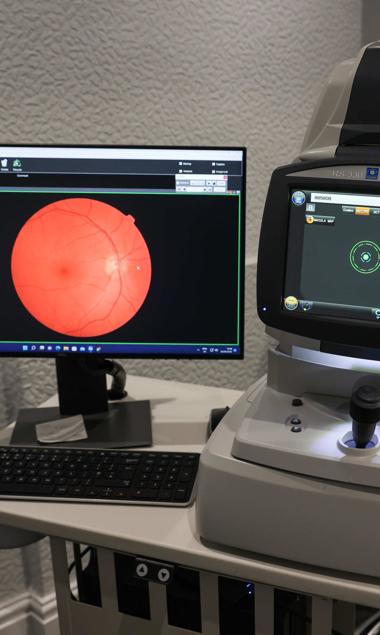Why is an OCT Scan Important?
An OCT scan is vital for detecting serious eye conditions early, often before you notice any symptoms. Conditions like glaucoma, macular degeneration, and diabetic retinopathy can progress silently, but with an OCT scan, we can spot these issues in time to make a difference. It’s one of the best ways to protect and maintain your eye health as you age.
The OCT scan also allows us to monitor existing conditions, making it easier to track changes over time and provide proactive care. Each OCT scan helps us to build a detailed record of your eye health, so we can track any subtle changes between visits. This “baseline” helps us detect conditions even earlier and tailor your care over time.
Who Should Have an OCT Scan?
OCT scans are beneficial for everyone, but they are especially important if you:
-
Are over 40 years old
-
Have a family history of eye diseases like glaucoma or macular degeneration
-
Have diabetes or high blood pressure
-
Are experiencing vision changes or discomfort
-
Want to ensure your eyes stay healthy and catch potential issues early
OCT scans are a great way to make sure you’re doing everything you can to protect your vision.
What Conditions Can OCT Detect?
An OCT scan can help detect various eye conditions, including:
-
Glaucoma: a leading cause of blindness that can be detected through changes in your optic nerve.
-
Macular Degeneration: a condition that affects central vision.
-
Diabetic Retinopathy: common in those with diabetes, affecting the retina.
-
Retinal Detachment: when the retina starts to detach from the back of the eye.
-
Macular Holes: small gaps in the macula that can cause blurry vision.
-
Optic Nerve Disease: affecting the nerve that transmits visual information to the brain.
-
High Blood Pressure-related Changes: which can impact the retina.
-
Cataracts & Corneal Disease: In some cases, we may use OCT technology to look at the front part of your eye (the cornea and lens) to assess conditions in the anterior segment.
Detecting these conditions early can help prevent serious vision loss.
What to Expect During an OCT Scan at Bayfields Opticians
The OCT scan is a quick, painless, and non-contact scan. Here’s what you can expect:
Before Your Scan - You’ll have a consultation with your optometrist to discuss any concerns or symptoms.
During Your Scan - You’ll sit comfortably while a small device takes detailed images of the back of your eyes. The test takes just a few minutes.
After Your Scan - Your optometrist will explain the results, and you’ll discuss next steps together.
No special preparation is needed, and the scan is completely safe.
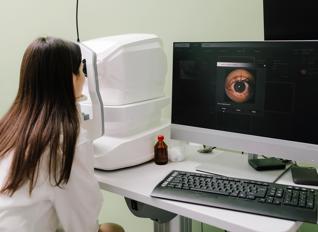
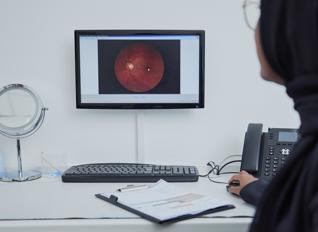
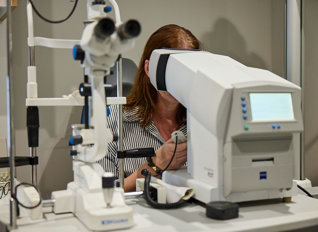
Here's what our clients think of Eye Tests at Bayfields Opticians
Benefits of OCT Scans
-
Early Detection: Detect conditions like glaucoma and macular degeneration before symptoms appear.
-
Peace of Mind: Regular OCT scans help you feel confident about your eye health.
-
Better Outcomes: Early intervention can lead to better treatment options and outcomes for a range of eye conditions.
How is an OCT Scan Different from a Standard Eye Test?
A standard eye test checks how well you can see and a check of the surface of your retina using high powered lenses.
An OCT scan goes much deeper. Instead of only showing the surface, it creates a 3D view of the layers beneath your retina. This helps us to spot early signs of glaucoma, macular degeneration, and other conditions long before they start impacting your quality of life. It also gives us a useful baseline to compare against at future appointments.
Many of our practices also offer optomap® scans, which capture a wide image of up to 85% of your retina in one panoramic view. While OCT shows the layers within the eye, optomap® helps us see far more of the retina itself.
Together, OCT and optomap® imaging give you the clearest possible picture of your long-term eye health.

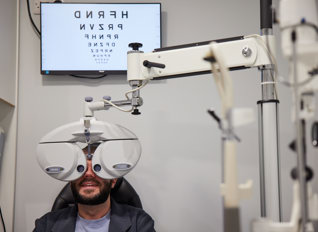
OCT Scan FAQs
Does an OCT scan hurt?
No, an OCT scan is completely painless. It is a non-contact, non-invasive procedure that uses light waves to take high-resolution images of the back of your eye. You may feel slight pressure as you focus on the device, but there is no discomfort involved.
Is an OCT scan safe for children?
Yes, OCT scans are safe for children. The procedure is quick, non-invasive, and uses light waves, making it suitable for young eyes. It’s a great way to ensure children’s eyes are healthy without causing any distress.
How much does an OCT scan cost at Bayfields?
We believe your eye exam should be more than just the basics. That’s why every one of our eye tests lasts at least 40 minutes and includes an OCT scan as standard, giving us a detailed, 3D view of your eye health. Our Advanced Eye Test includes an OCT scan and is £64 (£39 for NHS clients).
For the most comprehensive care, our Ultimate Eye Test combines both OCT and optomap® imaging. It’s £77 for adults or £49 for NHS clients. Click here.
How often should I have an OCT scan?
It’s recommended to have an OCT scan or an eye rest once a year or twice a year, depending on your eyes, age, have a family history of eye disease, or have conditions like diabetes. Regular scans help monitor your eye health and detect potential issues early.
Is OCT included in a standard eye test?
OCT scans are included in all eye tests as standard at Bayfields Opticians, in Our Advanced and Ultimate eye tests. We use the latest in technology and scans gives us a clear, in-depth view of your eye health.
How long does an eye test and OCT scan take?
An eye test with an OCT scan (Our Advanced Eye Test) and even eye tests with optomoap® scan (Our Ultimate eye test) take at least 40 minutes. The optometrist will tailor the eye test to your lifestyle and perform a full eye examination and the OCT / optomap® scans), giving you a thorough assessment of your eye health.
Is an OCT scan free through the NHS?
OCT scans are not included in NHS eye tests, but they can be added for a fee of £39 or £49 depending on your practice. We always recommend those who are eligible for an NHS eye test to have scans, so we can get a clear, in depth view of your eyes.
Can I have an OCT scan if I have cataracts?
Yes, you can still have an OCT scan if you have cataracts. The OCT scan provides valuable information about the health of the retina and optic nerve, which is essential even if you have cataracts. Your optometrist will be able to assess both conditions together.

